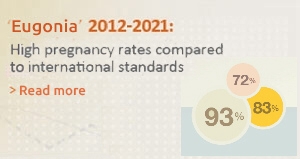The action of GnRH agonist analogues is similar to that of the natural hormone.
The GnRH agonist analogues, at the start of their administration and also in the case of their intermittent use, result in the stimulation and rise in the release of FSH and LH gonadotropins, through a flare-up mechanism. This happens because they stimulate the synthesis of GnRH receptors in the gonadotropic cells of the hypophysis (pituitary gland).
If the administration of GnRH agonists is prolonged, the ovarian function is suppressed due to the reduction of gonadotropin release. This reduction occurs due to the extended occupation of the GnRH receptors by the GnRH analogues and also due to the reduction of the number of GnRH receptors in the gonadotropic cells of the hypophysis. This phenomenon is also known as down-regulation or pituitary desensitization and has been considered a "paradox" in its first publication in 1975. Nowadays, we are taking advantage of this "paradox" to achieve suppression of the pituitary function by GnRH agonist analogues administration.
When are they used
GnRH agonists are administered towards the end of the last menstrual cycle (in the middle of the luteal phase, meaning around 7 days before the menstrual cycle is due) or in the beginning of the menstrual cycle and they progressively result in the suppression of the pituitary function. Since the pituitary gland is no longer active, the normal course of the menstrual cycle is suspended, the follicles do not mature and they do not rapture, and this allows us to administer gonadotropins in such doses to stimulate multiple follicle development in the time that we chose. Nonetheless, the continuous administration of GnRH analogues is obligatory, during the entire stimulation phase.
Commercial names
GnRH agonists that are available in Greece have the following commercial names: Arvekap (Triptorelin), Daronda (Leuprolide), Suprefact (Buselrelin) and Gonapeptyl. These come either in a pre-mixed dilution ready for subcutaneous injection, or in the form of a powder that needs to be mixed with a special diluent in order to become an injectable solution, or in a nasal spray. Their active ingredients are all similar. GnRH agonists administration may result in a little uterine bleeding (pseudo-period). Possible side-effects of treatment with GnRH agonists are a stuffy nose, hot flashes, headaches, night sweats, etc.






























